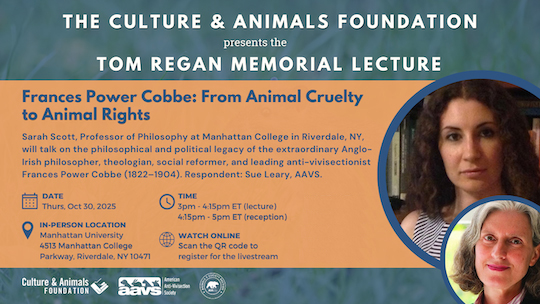Zachary Ferguson, a Ph.D. candidate in Philosophy at UNC–Chapel Hill, has been selected as the 2025 Tom Regan Visiting Research Fellow. Zachary is researching his dissertation on the evolution of the philosophical conversation about vegetarianism and veganism.
Zachary received his MA in Philosophy at the University of Wisconsin–Milwaukee and BAs in both Philosophy and Spanish and Portuguese at Vanderbilt University. He has published in journals including Politics, Philosophy & Economics and AJOB Empirical Bioethics and has presented at conferences including the Rice Graduate Animal Ethics Conference in Houston and the North Carolina Philosophical Society Conference. “I’m a philosopher and I’m interested in arguments about moral vegetarianism and moral veganism—very much in the tradition of Tom Regan,” Zachary says. In 2019, CAF established the Tom Regan Visiting Research Fellowship at the North Carolina State University Libraries, where Tom deposited his archives in 2003, and which now, as part of the Special Collections Research Center, constitutes the largest scholarly archive of animal rights collections in the country.
Zachary is particularly curious to tease out the different moral arguments inside the academy and in the wider culture. He hopes to bridge these differences between philosophy and advocacy by bringing philosophical rigor to practical moral questions about the animal-based products that we buy, use, and eat. Animal advocates outside of the academy often ask questions about whether we should wear this brand of shoes or eat that restaurant’s chicken sandwich. Philosophical conversations tend to lack this granularity, even as the field of animal ethics has grown within the academy.
In the SCRC’s collections, Zachary is particularly interested to see how his fellowship’s namesake changed his own arguments and positions over time.
“I’ve been looking through the Tom Regan Papers, and I’ve been looking at earlier drafts of his published work and his handwritten notes in response to where he sketches certain kinds of arguments,” Zachary says. “It seems to me, from what I’m seeing in some of his handwritten notes, that he’s similarly unsatisfied with some of the most popular bridge principles that philosophers put forward, and he frames it using separate ways of getting at what he thinks is the wrong of purchasing or eating across his career in different published and unpublished materials.”
Zachary also plans to explore the SCRC collections of publications, pamphlets, and ephemera from different animal rights and animal protection organizations across different countries and time periods. He notes that, over the last fifty years, debate has tended to focus on the moral permissibility or impermissibility of purchasing meat and other animal food products that were produced using factory-farming methods.




